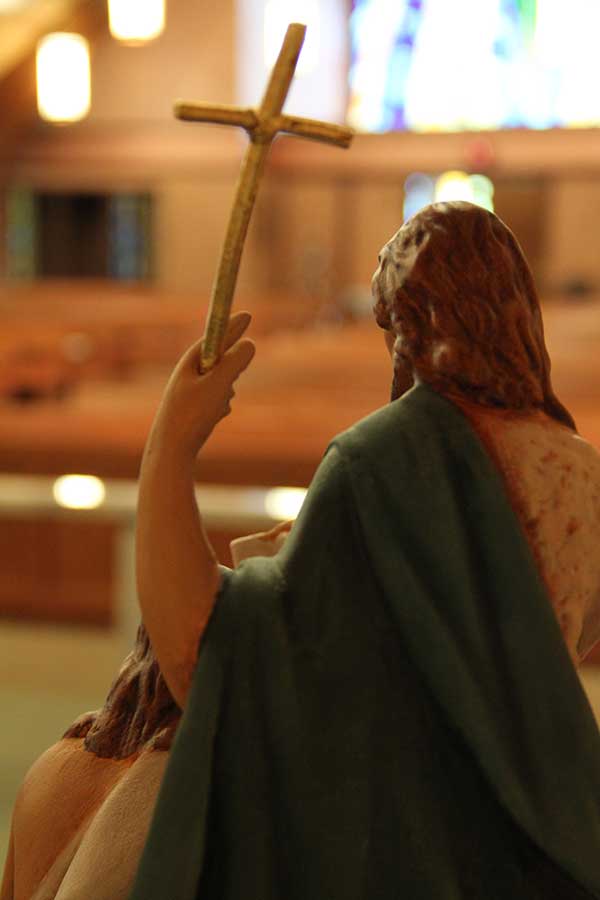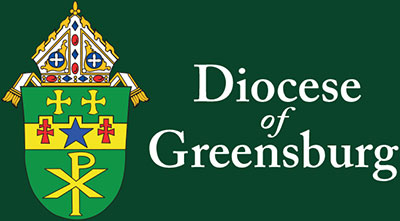

MARRIAGE TRIBUNAL
The primary duty of a diocesan tribunal (located at 723 East Pittsburgh Street, Greensburg) is to determine, on the basis of information presented to it, whether or not a marriage, which ended in civil divorce, is invalid according to church law. It does not lie within the competence of a church tribunal to determine the moral status of a person since this belongs to God alone.
The tribunal is the church’s court in which legal acts and procedures are observed to solve disputes and questions. It is composed of judicial personnel, i.e., judges, advocates, defenders and others. Judicial trials are undertaken to pursue or vindicate rights, to declare facts or to impose penalties on their findings.
The diocesan bishop has chief oversight for the diocesan court. There are various officials at the court. The judicial vicar heads the diocesan court and is assisted by judges of the tribunal. The defender of the bond argues to uphold the bond of marriage that is in question. Procurators represent and act on behalf of parties, while advocates ensure the rights of the parties are upheld. All exercise judicial authority in accord with canon law.
SEEKING AN ANNULMENT
The petitioner meets with the parish priest, deacon or designated pastoral minister who assists in completing an initial questionnaire concerning a previous marriage. In the Diocese of Greensburg, the petitioner can contact the tribunal directly at 724-837-9523 to begin the process.
The completed questionnaire is sent to the tribunal. The tribunal examines the data indicating acceptance of the case. A detailed questionnaire is sent to the petitioner requesting that the marriage be examined. The former spouse (respondent) is invited to complete a similar questionnaire. Names of several witnesses who are aware of the relationship are requested. Then the questionnaires are returned or the allotted time is expired, written testimony from witnesses is also gathered. The tribunal may collect other data that could be helpful in preparing a case, e.g. statements from doctors, psychologists, counselors, etc.
When all data is collected, the tribunal considers the evidence and renders a decision. If a decision is affirmative, it is submitted to a second court for ratification. If a decision is negative, it can be appealed. More evidence or testimony can be presented.
Special guidelines/requirements for cases brought to the diocesan tribunal:
- A civil divorce has been obtained.
- The marriage took place within the Diocese of Greensburg.
- One of the parties resides in the Diocese of Greensburg.
Download the Preliminary Form. For additional information, please contact us at 724-837-9523.
ANNULMENTS IN THE CATHOLIC CHURCH

For centuries the Catholic Church has taught the indissolubility of marriage. However, the church has also recognized the possibility that a marriage for one reason or another may not have been valid at the time of consent. In other words, the church recognizes that a particular marriage should never have come into being in the first place.
When requested to examine the quality of a couple’s consent, it is possible for the church to issue a declaration of nullity, which is entirely different from a dissolution of marriage. A dissolution in the church, like a civil divorce, acknowledges that a marriage once did exist, but no longer exists.
A declaration of nullity is a decree officially stating the finding that although a marriage did appear to exist, it actually never did as a sacrament. This can, of course, give rise to a certain amount of confusion. Some find it difficult to understand this distinction. In reaching a decision about the validity or invalidity of a marriage, and issuing a decree of nullity, the church is not annulling anything. It is simply stating and only after thorough investigation, that in a particular case a valid sacramental marriage never existed.
In the United States today, because of the number of failed and divorced marriages, there is a pastoral need to use canon law to provide an opportunity for a journey of faith. The ministry of the matrimonial tribunals in the church provides this opportunity to bring healing to individuals and/or couples in need. Even with tribunals functioning efficiently, it is estimated that no more than 10 percent of the potential petitions for annulments are ever brought to the church tribunal.
On October 3, 1941, Pope Pius XII called for a prudent use of the new discoveries of the behavioral sciences, in particular psychology and psychiatry in examining unfortunate situations of marriage failures. It became evident that in some cases people were not unwilling to enter into marriage, but rather were incapable of doing so – their thought processes were severely impaired, their judgment seriously affected, or they were unable to assume the essential obligations of marriage.
With help of the behavioral sciences, it has become somewhat easier to understand not only why marriages failed, but also why some people were not “eligible” (or juridically capable), from the outset, to validly enter into such a sacramental union.
GET ANSWERS ABOUT TRIBUNAL PROCESS
All failed marriages, whether Catholic, Christian or non-Christian, which have been a part of an individual’s experience, need to be examined. For those which have ended in divorce, a Tribunal process will be necessary before the individual would be free to enter into another marriage. For those who have entered another marriage, this process will be needed before they can participate in the sacramental life of the church.
Click a frequently asked question below to see the answer.
Are there any special guidelines/requirements for cases brought to the tribunal within this diocese?
1. A civil divorce has been obtained.
2. The marriage took place within the Diocese of Greensburg.
3. One of the parties resides in the Diocese of Greensburg.
Does an annulment affect the legitimacy of the children?
No. An annulment in no way affects the legitimacy of the children. It was decided long ago that under canon law, children of a putative marriage are legitimate. A putative marriage is one that is believed by at least one of the partners at the time to be a real marriage. Almost all annulled marriages fall in this category. The same rule of the legitimacy of children holds true, incidentally, in civil law annulment cases. And in any event, a church annulment does not even attempt to speak to the issues of legitimacy, laws of inheritance, and other civil domestic issues.
How long does it take to get an annulment?
Much depends upon cooperation and how quickly testimony is given and collected. All should be aware that there is no guarantee of an affirmative decision. No marriage date is able to be set till an affirmative decision is rendered.
If I am legally divorced, why do I need an annulment?
While a divorce declares a marriage dissolved, an annulment (declaration of nullity) declares that a valid sacramental bond never existed. In order to be free to enter into a valid marriage, persons must know their marital status in the eyes of the church.
If someone receives an annulment, does that automatically free his or her partner?
Yes, since it is the marriage relationship which is being examined, the decision applies to both parties in a marriage.
Is the process expensive?
In the Diocese of Greensburg the usual fee is $175. Inability to pay does not influence decisions. This amount does not cover all the expenses of the tribunal. The Diocese subsidizes more than two-thirds of the tribunal operating budget.
Isn’t this just semantics; isn’t an annulment like getting a divorce under another name?
Civil law views marriage as a contract that can be broken or dissolved. The church understands marriage to be a covenant relationship that is indissoluble. A covenant relationship demands more than the establishment of a contract. Only when certain intentions and capabilities are brought to the relationship by the parties involved is the covenant bond real and genuine.
What are some possible reasons for an annulment?
Some possible reasons for an annulment are:
1. Lack of ability or intention to enter into a lifelong commitment.
2. Lack of ability or intention to be faithful to one’s spouse.
3. Lack of freedom in entering into the marriage.
4. Intention against having children.
5. Lack of complete commitment – placing conditions or restrictions on the commitment.
6. Lack of ability or intention to form a relationship based on love and respect for the good of one another.
7. Psychological, mental, emotional illness or personality disorders.
What does the church consider necessary elements for a binding union?
The essential elements are:
1. Free and intentional commitment between a man and woman of marriage age.
2. The intention to form a partnership of life and love for the well being of each other.
3. That the commitment is lifelong and indissoluble.
4. That the partners pledge themselves exclusively to one another.
5. That there is an openness to children.
6. For Catholics that the Catholic form of marriage is observed.
What is an annulment?
An annulment is a declaration by the church that the marriage in question was not binding in the eyes of the church – that a required intention or capability was not present. An annulment (declaration of nullity) does not deny that a real relationship existed or imply that the relationship was entered into with ill will or moral fault. It is a statement which says that the church has judged that the relationship lacked at least one of the elements considered essential for a binding union.
What is the difference between an annulment and a divorce?
A divorce is a dissolution by a civil court of an existing union. An annulment (declaration of nullity) is a procedure which determines a person’s marital status in the Catholic Church.
What is the status of a Catholic who has remarried without an annulment (declaration of nullity)?
A Catholic in a second marriage without an annulment for their first marriage can attend Mass, participate within the church community, but cannot receive the sacraments.
What is the tribunal?
The tribunal is a church office that examines broken marriages according to canon (church) law to make judgments about the marriage bond. The tribunal also addresses other issues involving canon law and the church community.
When should the convalidation of a marriage occur after an annulment from a previous marriage has been received?
Convalidation can take place anytime after the judge’s decision has been confirmed by the appeal court. However, it should not take place until the couple has had appropriate marriage preparation according to diocesan policy. The convalidation allows the Catholic party to once again participate in the sacramental life of the church.
Who makes up the tribunal?
The tribunal officials include:
1. Judges: canon lawyers who hear the cases and make the decisions.
2. Defender of the Bond: one who acts in the name of the church to present a defense of the validity of the bond; they examine and question the evidence presented.
3. Auditors: one who gathers the documents and testimony and presents the case to the judges.
4. Procurator/Advocate: a representative who works directly with the petitioner and/or respondent.






